Top A/B Testing Tools to Optimize Your Conversion Rates in 2021
The right A/B testing software can help you generate more leads and sales and maximize the potential of your landing pages.
With so many A/B testing tools on the market, how can you pick the best platform that suits your A/B testing program?
Improving your online marketing campaigns isn’t a one and done thing. Testing should be done consistently to keep up with the ever-changing nature of the web and consumer behavior.
That’s why using behavioral targeting is a must for businesses that want to stay afloat online.
The truth is that subtle changes such as changing the position of your opt-in form on the landing page, changing the color scheme of the site, can make a big difference.
According to WordStream, the average website conversion rate is 5%, while the most optimized websites have conversion rates of 11% or more. That’s roughly 5x more than the average sites.
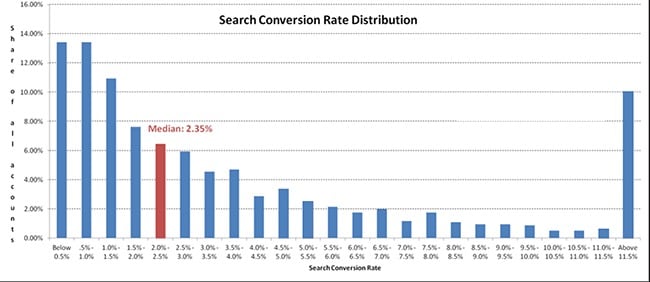
So where do you start? How can you find the best A/B testing platform to optimize conversion rates?
Read on to discover 15 of the best A/B testing tools for every need and budget:
1. Convert
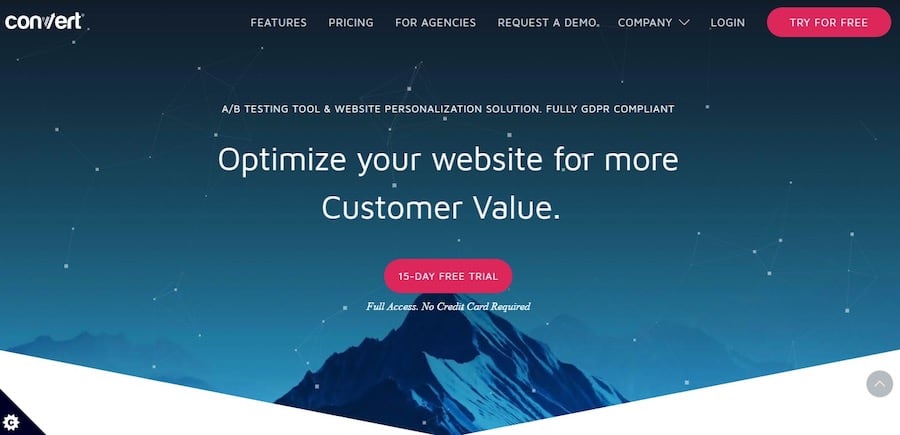
Convert is one of the top A/B testing tools for CRO agencies. It’s one of the fastest testing tools you can trust, built to eliminate issues that hinder CRO service providers from achieving their optimization strategy.
Advanced A/B testers can access features such as blink handling, breakdown of conversion patterns, and advanced editing.
Convert’s A/B testing tool is different from many other testing tools because it’s fully privacy compliant. What does this mean?
It doesn’t store your data in the default setting and only uses first-party cookies to ensure accurate visitor tracking.
Also, you can easily integrate and sync your content marketing system and data from 80+ tools. This gives you access to a deeper level of personalization, using your existing tech stack, and making it possible to build customer profiles in real-time.
Pros
- Fully privacy compliant: no personal data is ever stored,
- Fast and flicker-free,
- Run unlimited tests,
- Integrates with 80+ 3rd party tools (e.g., Shopify, WordPress, Mixpanel, Hotjar),
- Reliable, fast customer support.
Cons
- Basic post segmentation on the Kickstart plan.
Experience privacy-compliant, flicker-free, limitless testing. Try Convert Experiences for free for 15 days.
2. AB Tasty
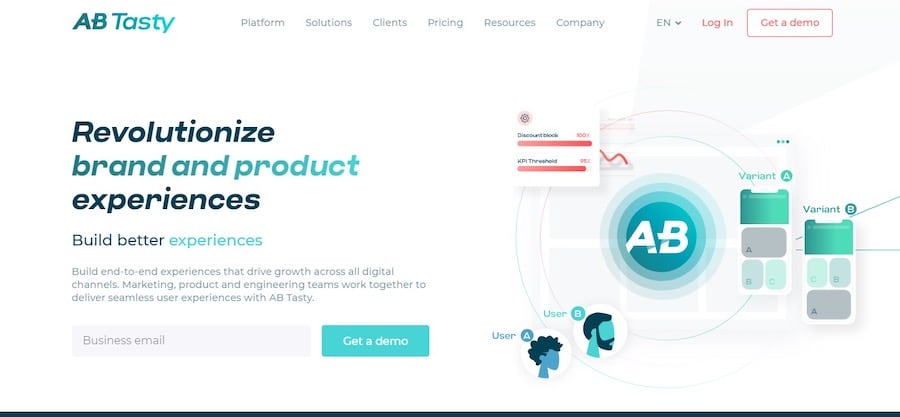
Are you ready to drive growth across all digital channels? AB Tasty takes an inclusive approach to A/B testing.
It’s designed for marketing & growth teams, Product Managers, Engineers & Developers. It’s a good A/B testing software for validating options, building advanced personalization scenarios, and segmenting your user base.
If your focus is to maximize conversions, you might want to give AB Tasty a shot.
You can also test two or more variations of an element on your page, for example, call to action wording, images, or colors. You can do split testing and get clean and rich insights. The multivariate testing option allows users to run combo tests simultaneously.
Pros
- Run unlimited experiments,
- Clean and easy-to-use interface,
- The widget feature is fun to use,
- Wide range of targeting options available,
- Reliable customer support.
Cons
- Doesn’t give automatic insights about audience performance (especially for an active experiment).
- Google Analytics integration is complex, it requires coding.
3. Optimizely
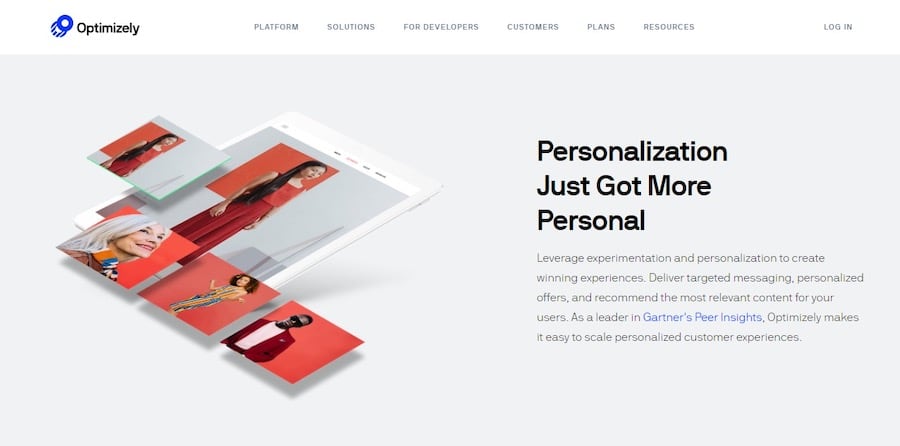
Optimizely is arguably one of the most trusted A/B testing software. It’s grown to become a market leader. It’s for product and marketing teams.
One of the core features you’ll love about this tool is the ability to run A/B tests on multiple pages and platforms at the same time. Few tools have this functionality built in.
For instance, it’s easy to run tests on your sales page and contact page while also testing your homepage on mobile.
Although Optimizely is a market leader, it’s really pushing people away with its pricing structure.
Optimize X Web Business plan costs approx. $64k yearly for 10 million impressions. Users have to pay upfront to use it. The Enterprise plan costs over $130k annually for the same impressions.
Optimizely also doesn’t have a monthly payment option, only annual subscription packages. This is a huge turnoff for users who would rather stick with a monthly payment plan and cancel anytime.
On the flip side, one disadvantage is it forces users to make a long-term commitment.
While it’s easier to cancel on a monthly plan, it’s not as straightforward with an annual plan. It’s also easy for the customer support to lose touch with the users once a yearly contract has been signed. The interaction is reduced. It’s not so with a monthly plan.
Pros
- Clean and easy-to-use interface for executing tests,
- Quick support on iOS,
- Event tracking is enabled,
- Integrates with digital analytics tools (e.g., Google Analytics).
Cons
- Events configurations are complex,
- It’s more expensive than most tools in this list (and their pricing is always changing),
- Lacks snippet integration,
- Customer support is lacking.
4. Zoho PageSense
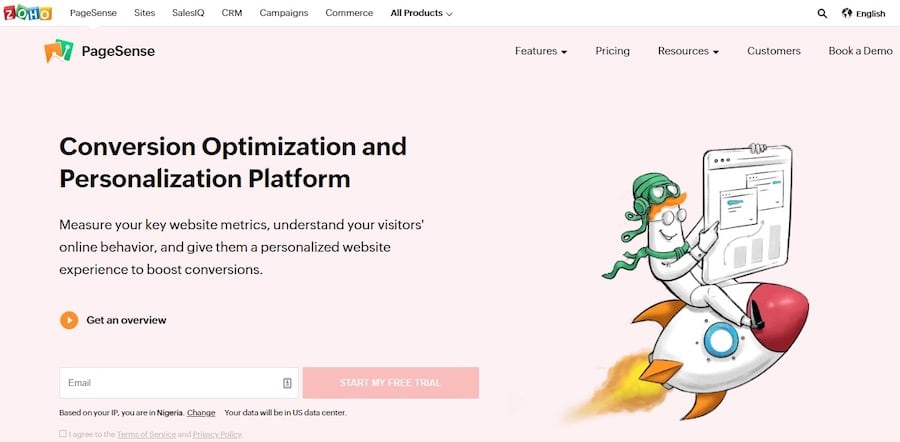
PageSense (by Zoho) is a Conversion Optimization and Personalization platform for marketing companies.
In addition to basic testing, use this A/B testing tool to remove friction in form submissions and boost conversions. This is one of its advanced features.
How do you know what works on your website without running experiments?
With PageSense, you can nail those critical metrics that impact conversions. iNECTA, a company that offers a Food ERP Solution to seafood traders uses this strategy.
The company’s focus is on helping its users maximize sales at every stage of the funnel.

Using PageSense, you can pinpoint what drives visitors to behave a certain way when they land on your website.
It integrates with Google Analytics, Mixpanel, Google Ads, Intercom, and more.
PageSense allows you to track, analyze, optimize, personalize, and engage your site visitors to maximize conversions.
Pros
- Run plenty of tests on your website,
- Easy-to-use funnel testing tools,
- It’s cheaper than most competitors.
Cons
- Online reviews of the tool mention poor team support
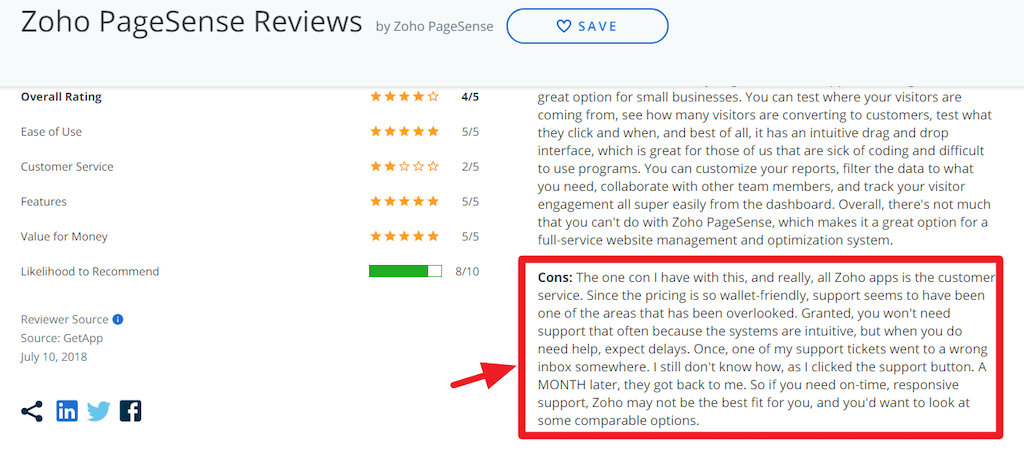
- Lacks an advanced code editing section.
5. Leadformly
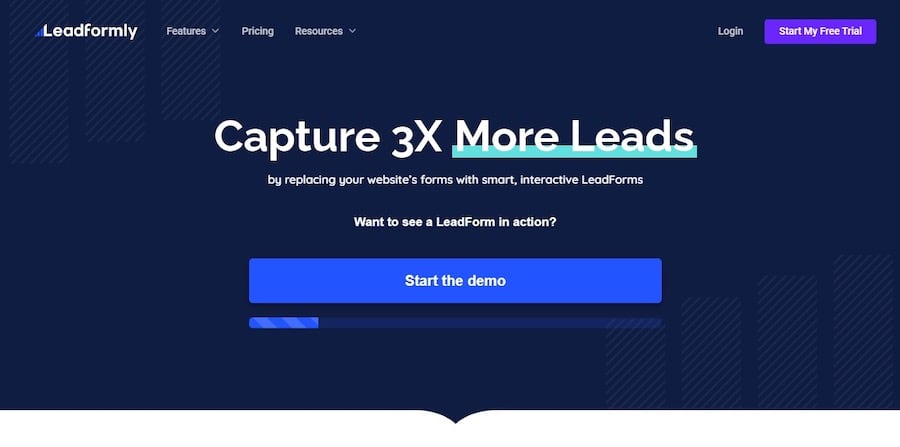
Leadformly is primarily a lead capture form builder. However, you also get dedicated A/B testing tools for your web forms. It’s primarily for small and mid-size businesses that want to create high-converting web forms, with lead scoring and notification capabilities.
You know how important web forms are, therefore, testing them out is critical to maximizing conversions on your homepage, contact pages, and sales pages.
If your contact form isn’t converting well, you’re leaving a ton of money on the table. For example, after uSERP increased its organic traffic, the team discovered that getting people to fill out the form and make inquiries is the only action that drives sales.
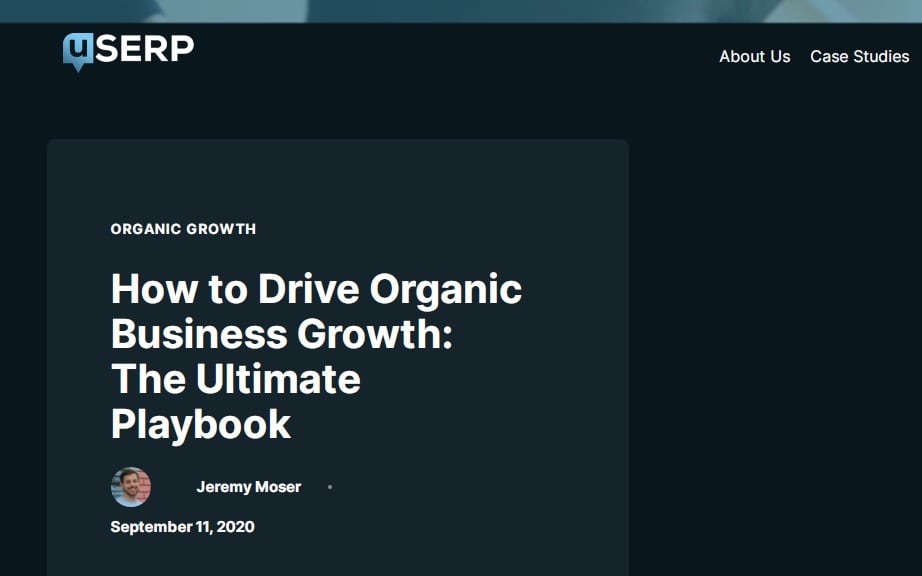
As simple as web forms are,
“74% of businesses use web forms to capture leads, with 49.7% stating their online forms are their highest converting lead generation tool.”
Leadformly’s A/B testing features provide a depth of insights you need when using web forms on your page.
For example, you can see which fields users spend more time thinking about before filling it out, or which field users are dropping off, and why. With these insights, you can create better forms, use the right number of fields, or use the multi-step form approach to boost conversions.
Pros
- Easy to use interface,
- A vast collection of optimized form templates,
- It’s much cheaper compared to the competition,
- Integrates well with other marketing apps.
Cons
- No free plan,
- Lacks a lot of the advanced functionality of its competitors,
- The API is too complex to understand and use.
6. VWO
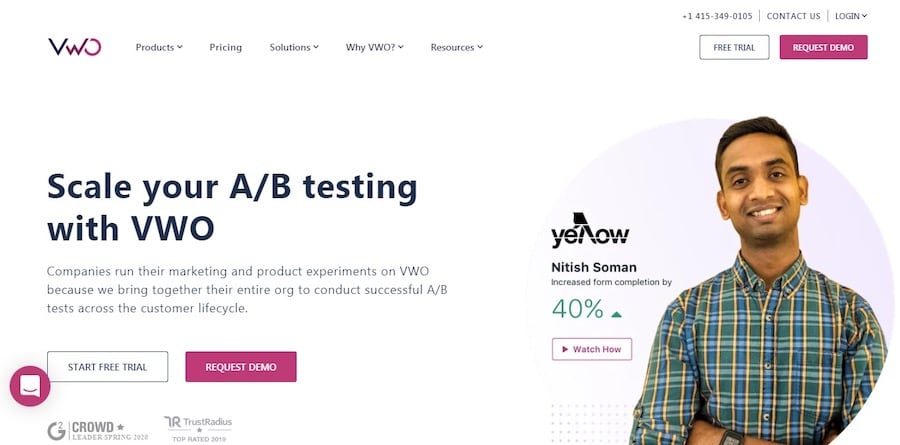
VWO is another established tool in the A/B testing arena. It’s an all-in-one marketing platform with a full suite of CRO tools designed for eCommerce and small businesses.
You can scale your A/B testing using VWO, run marketing experiments across the customer lifecycle, and more.
This platform offers extensive tools for A/B testing, multivariate, and split URL experiments.
The visual editor allows users to build variations without writing a single line of code, use advanced targeting and segmenting options, etc.
One of the enterprise features that VWO offers is its asynchronous coding: designed to enhance how your test performs to avoid slow loading times and flickering, which is gradually becoming a norm with a lot of A/B testing software.
Pros
- Easily tailor your tests to unique scenarios,
- Quickly build and execute tests with intuitive UI,
- On-site survey tools for getting feedback from users,
- Session recording tools shows you how people use your site,
- Excellent customer support.
Cons
- Form tracking can be improved,
- Not useful for low-volume traffic websites,
- It doesn’t load fast,
- It comes with a hefty price tag.
7. Leanplum
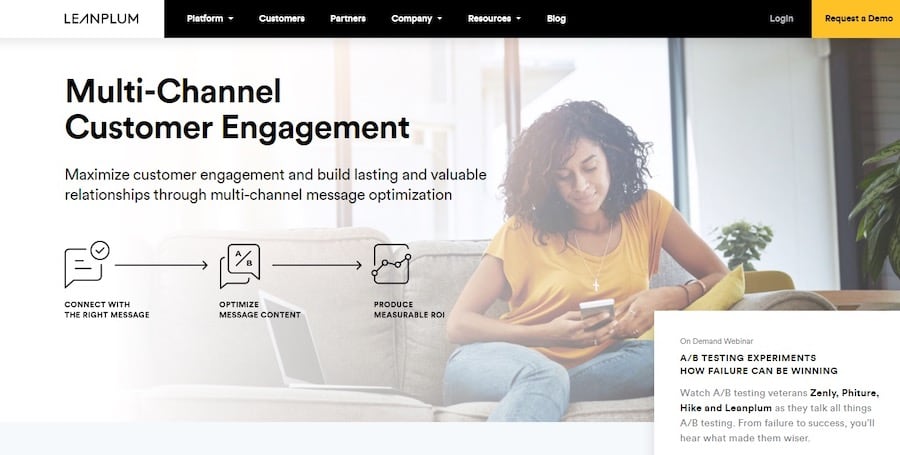
Leanplum offers A/B testing capabilities to help top brands drive multi-channel customer engagement across email, mobile, and web.
You get deep insights into your campaigns, such that when your test fails, you can turn failure into winning campaigns.
You can also use data from Keyword Gap analysis to run profitable tests on your SEO-optimized pages to get more organic clicks and traffic to your pages.
Here’s how it works:
- Connect with the right message,
- Optimize your content through A/B tests,
- Get measurable ROI.
Producing measurable ROI is critical to remain in business. Use Leanplum to drive conversions, so that when customers visit your website, read your email, access your mobile app, or view your ad, they convert.
Pros
- An intuitive and clean campaign set up process.,
- Advanced analytics to help you understand customers better,
- The tool handles user data & segmentation well.
Cons
- The email testing functionality isn’t robust enough,
- Team collaboration capabilities are limited.
8. HubSpot

HubSpot is an all-in-one marketing and Conversion Rate Optimization (CRO) platform for marketing companies and online retailers. It also offers handy tools for split testing your pages.
Although you’ll need the Professional plan to unlock HubSpot’s A/B testing features, it might be well worth the cost if you want to be more flexible with your experiments and integrate with your CRM and customer segments.
It’s easy to set up an A/B test.
Once you’re logged in, follow this path:
- Navigate to Marketing > Website > Landing pages or Website Pages.
- Click the Actions drop-down menu and choose Run a test.
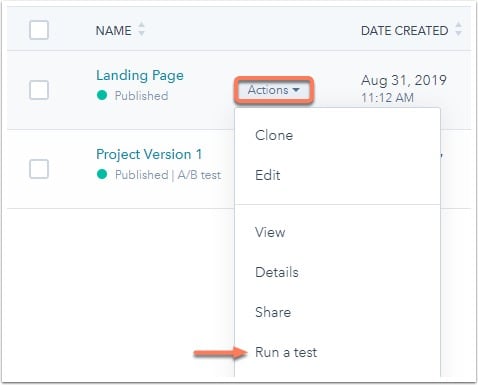
The truth is that HubSpot comes with an enterprise price tag but you get a lot of tools built-in, so you don’t need to spend money on third-party tools and build integrations.
For large organizations with 100 – 1,000 team members, this could mean increased productivity and fewer onboarding challenges. Being able to collaborate from within a single system can quickly increase productivity and keep the team in check.
Pros
- Easily use HubSpot’s email testing tools,
- Tracking potential customers is quite easy,
- Run complex A/B tests on your eCommerce pages,
- Integrates well with third-party tools.
Cons
- Mobile testing can be improved,
- Might be difficult to navigate for beginner CROs.
9. Apptimize
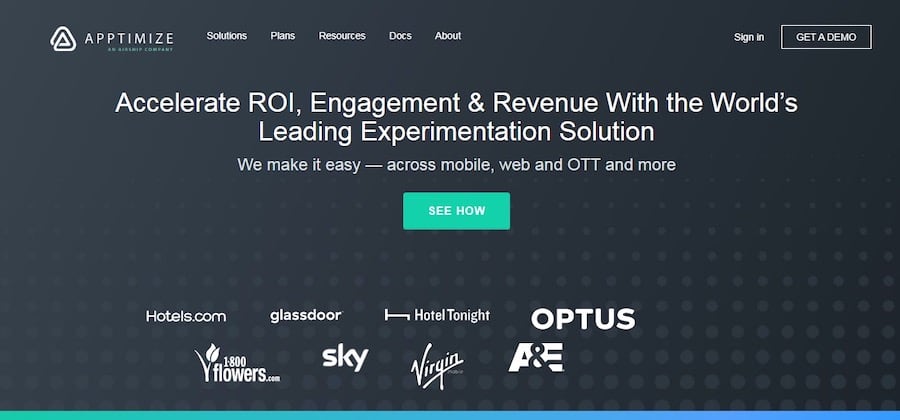
Apptimize offers the possibility to run A/B tests on mobile apps, works with iOS and Android mobile devices.
Companies and website owners can run experiments across mobile, web and OTT, and more. Virgin Mobile, Discovery Channel Optus, Glassdoor, MotorTrend, Hotels, and 1.800. Flowers are among this A/B testing tool’s customers.
Today, mobile is a huge marketing channel. Increasing mobile app conversions is just as important as optimizing mobile sites and desktop apps. With Apptimize, you can run split tests on all three channels.
Pros
- Intuitive and clean user interface,
- It’s useful for iOS and Android mobile app testing,
- Quickly integrates with other marketing tools,
- It has feature flags to simplify development.
Cons
- Requires a learning curve to understand the reporting dashboard.
10. Adobe Target
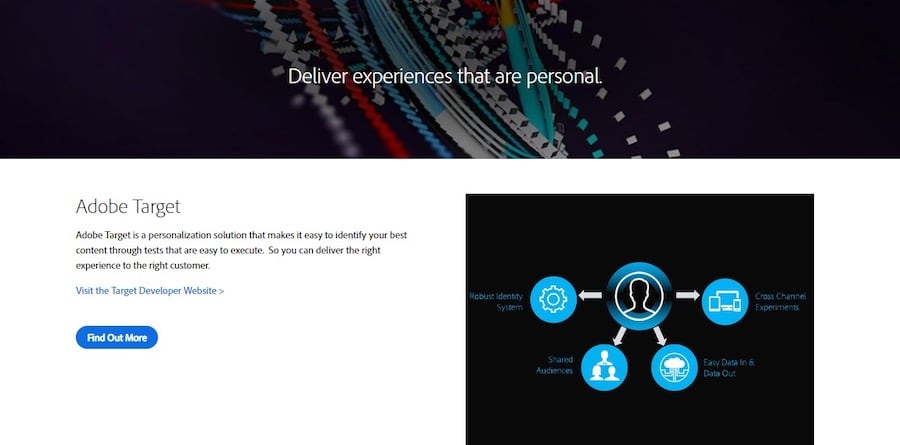
With the Adobe Target A/B testing tool, marketing agencies and top brands get a personalization solution that helps identify how content is performing.
The tests are easy to execute; the rich insights can help brands create better content and promote existing ones.
Adobe Target has a definite goal of helping businesses pinpoint their best content —
so that they can deliver the right experiences to customers.
The tool uses an algorithm to automatically effect changes based on a visitor’s behavior on your site to deliver exactly what they need. You can make more money by personalizing the customer’s experience on your page.
Pros
- The interface is easy to use,
- Provides accurate real-time data reports,
- Integrates well with Adobe Analytics,
- Website personalization tools for both beginners and experts.
Cons
- Testing on a large scale can be slow,
- The form-based editor requires a learning curve.
11. Conductrics
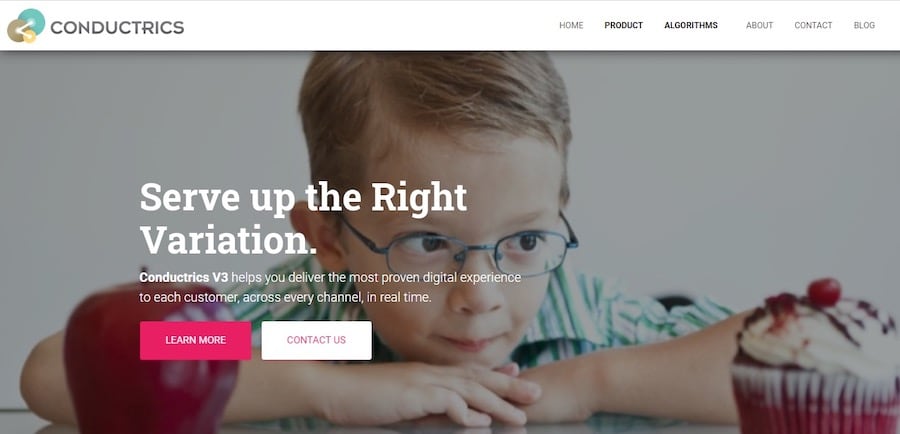
Conductrics is an A/B testing software that allows marketers and developers to set up and preview content variations visually, integrate into any site, test headlines, implement machine learning, etc.
This tool is designed to help businesses deliver the best digital experiences to each customer that lands on their web pages, regardless of the channel (e.g., mobile, desktop, app) they used, in real-time.
So whether you’re a startup, creating online courses, or in the podcasting scene, your customers need to personally connect with your brand. It’s all about providing rich experiences to your customers.
Conductrics stands out from the competition by focusing on variations that work. No matter what your team comes up with, it can be tested.
Pros
- WYSIWYG feature makes testing easy for beginners,
- Full control over your experiments,
- The Audience Discovery feature is handy,
- No script is required when setting up tests.
Cons
- The overall navigation can be improved,
- Not suitable for advanced users.
12. Kameleoon
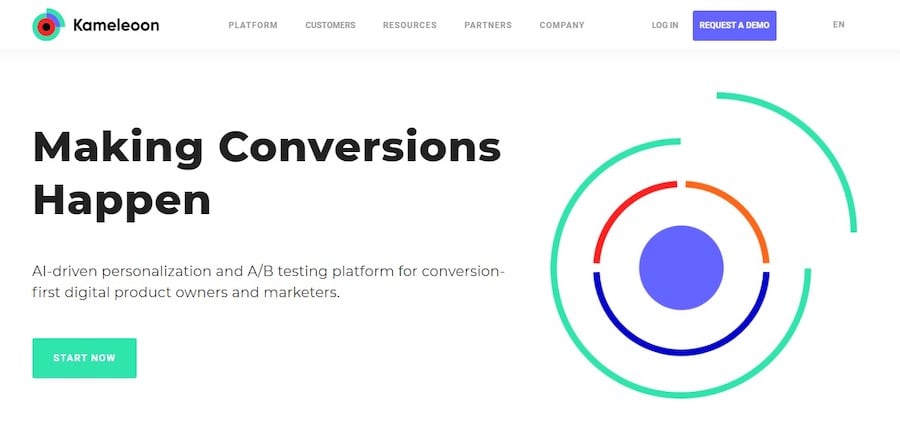
Kameleoon is an AI-driven personalization and A/B testing platform for eCommerce, marketing, and enterprises.
It uses artificial intelligence to drive a set of personalization tools to help you optimize conversions on your website.
Through Artificial Intelligence (AI), Kameleoon delivers some advanced insights about the visitors that you attract to your website.
This tool is most ideal for businesses and marketers skilled at running experiments and who want to scale. Use the insights gathered from your tests to implement quiz marketing.
However, if you’re just getting started, the advanced tools might be too complicated to understand.
Pros
- AI-driven personalization tools are easy to use,
- Get reliable data insights,
- Easily predict visitors’ intent in real-time,
- Excellent customer support.
Cons
- The tool has a steep learning curve,
- It’s not suitable for beginners.
13. Oracle Maxymiser
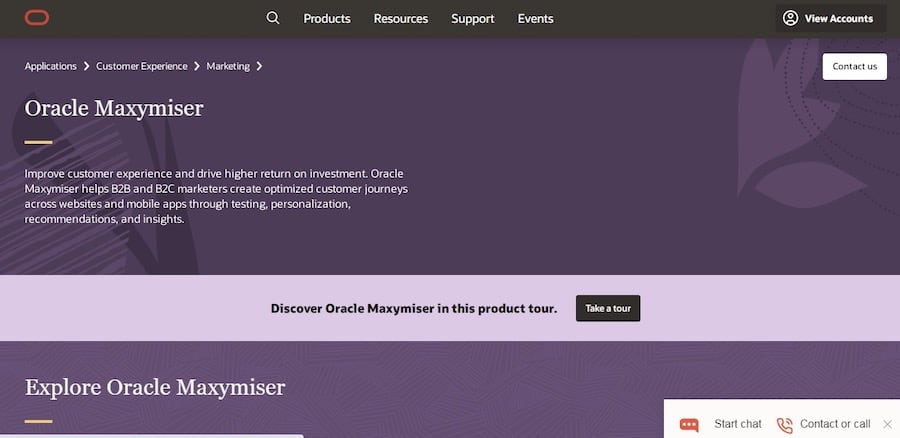
Oracle Maxymiser is an A/B testing and personalization tool for online marketing companies and established organizations.
If you’re concerned about improving customer experience on your website and driving higher ROI, the set of testing tools provided by Oracle Maxymiser can help you create optimized customer journeys across websites and mobile apps.
It’s ideal for both B2B and B2C companies that want to get customer insights, get recommendations on what to improve, and start personalizing customer experiences.
One unique feature is that you can easily target your most profitable customer segments and let the Oracle Maxymiser tool automatically build a customer profile for you.
Pros
- Set up tests on multiple devices (iOS, Android, Web),
- Get deeper insights about customer behavior,
- Run complex tests and access reports in one place.
Cons
- The self serve feature isn’t reliable,
- The user interface could be better.
14. Splitly
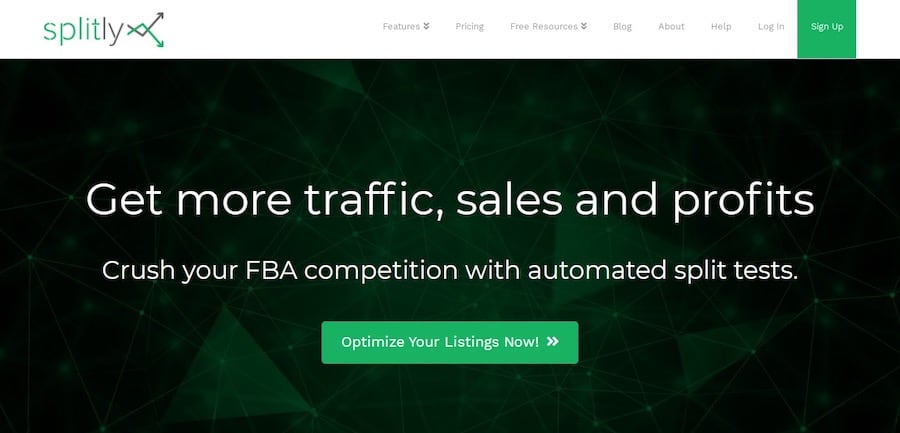
Splitly uses Artificial Intelligence (AI) to boost conversions for Amazon product listers.
If you’re an Amazon FBA merchant, you can use the deep insights to get more traffic, increase your sales, and grow your bottom line.
With more than 35 million Amazon Product Listings, you don’t stand a chance if you’re not doing something different.
Using a range of Algorithmic Split testing tools provided by Splitly, you can test every element of your product listing to boost conversions and profits.
You can also test your images, pricing, features, titles, descriptions, and target keywords.
Pros
- Simple user interface,
- Leverage AI to understand what Amazon buyers want,
- Test multiple product listings simultaneously,
- Save time with automated split tests,
- It’s cheap (starting at $47/month).
Cons
- It’s suitable for ONLY Amazon FBA sellers,
- The Starter plan only allows 3 concurrent tests.
15. Freshmarketer
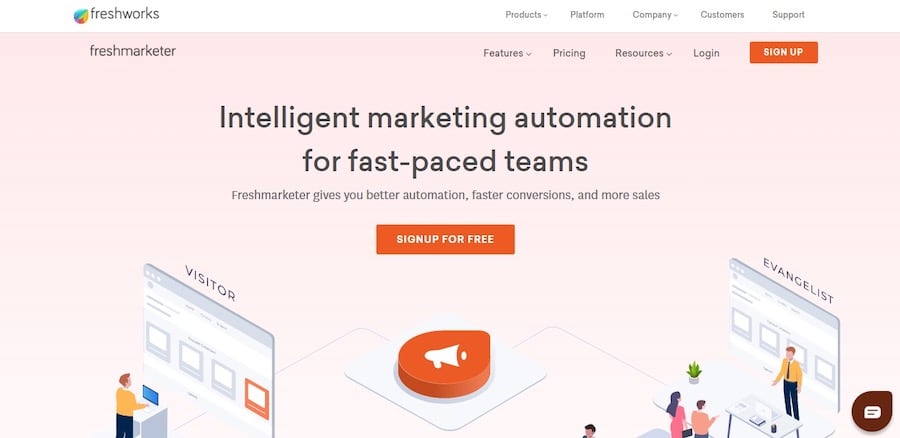
Freshmarketer (by Freshworks) is an intelligent marketing automation platform for marketing teams. It gives teams the tools to automate better, drive conversions quickly, and significantly grow sales.
It comes with powerful A/B testing features that give deeper insights into customers’ preferences.
Run experiments to improve your website’s performance, make the most of your traffic, get more signups, and make more money.
With Freshmarketer, you can create responsive and converting emails and test your hypotheses to determine what works.
Pros
- Clean and intuitive user interface,
- Easy-to-use heat maps,
- Keep your workflow clean,
- Get rich A/B test insights for your campaigns.
Cons
- Pricing might be high for small businesses,
- The free plan provides basic features (not really useful).
Conclusion
Not all these A/B testing tools will work for you. Some are for beginners (for basic tests) while others are for more advanced users and CRO agencies.
The good news is that 98% of the tools here offer free trials. So you can test one or two out before committing to the monthly renewals. It’s a win/win.
If you’re an online marketer, you can’t ignore that A/B testing is the way to move forward, especially in these trying times.
Check our unbiased comparison of the top A/B testing tools out there — fit for every need.

Written By
Burkhard Berger

Edited By
Carmen Apostu
